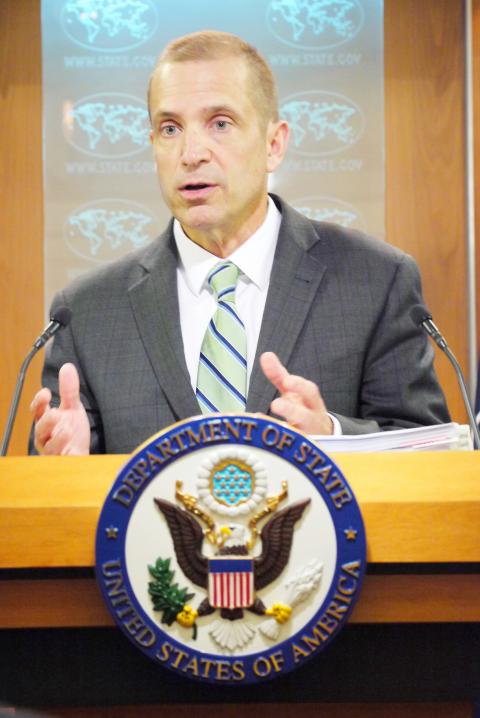The US Department of State on Wednesday said it was “frankly disappointed” with President Ma Ying-jeou’s (馬英九) decision to visit Itu Aba Island (Taiping Island, 太平島).
The relatively strong diplomatic reaction was given by spokesman Mark Toner at a regularly scheduled news briefing.
“We view such an action as unhelpful” and it would not contribute to the peaceful resolution of disputes in the South China Sea, he said.

Photo: CNA
“We urge Taiwan and all claimants to lower tensions, to de-
escalate tensions, rather than take actions that could possibly raise them,” Toner added.
In response to questions from the Taiwanese press, Toner said that the US had been very clear about its disagreement with China building structures on South China Sea islands.
“We want to see a halt among all claimants to further land reclamation, construction of new facilities and militarization of outposts,” which would help lower tensions and create space for peaceful resolution, he said.
Asked if Ma’s trip would harm US-Taiwan relations, Toner said: “We have very strong relations with Taiwan, but sometimes we disagree on their actions.”
Toner said the US was committed to a “one China” policy and looked forward to working with president-elect Tsai Ing-wen (蔡英文) and building stronger relations with Taiwan, but “we disagree on this particular act.”
Toner was asked why Ma could not visit an island that Taiwan had occupied for decades and why Taiwan was not included in diplomatic discussions about the South China Sea.
“I can’t speak to whether we would invite Taiwan to take part in diplomatic conversations,” he said.
Ma had “every right” to make his position clear on the South China Sea, Toner said, adding: “We just disagree with this particular action. We view it as frankly raising tensions rather than what we want to see which is de-escalation. We want to see dialogue and welcome all voices in the region weighing in on that dialogue and it is only through a diplomatic mechanism that we can successfully resolve the South China Sea.”
He said that Taiwan is a valued partner and Washington would “continue to listen to their concerns and reflect their concerns.”
Richard Fisher, a senior fellow at the International Assessment and Strategy Center in Alexandria, Virginia, said the US statements sounded like Washington was “throwing Taiwan into the same category of aggressor as China.”
“This may be an attempt to appear neutral and to respond to Chinese criticism that Washington is always bashing China. But criticizing Taiwan will not result in China ceasing its military base building or prevent the likelihood that it will attack other islands and turn them into Chinese military bases as well,” he said
Fisher said Taiwan had sought to differentiate its methods and objectives from China.
“It is China which is clearly seeking to obtain near total control of the South China Sea, build the capability to choke off one of the world’s most important maritime commercial life lines, isolate US allies in Asia and increase its ability to threaten Taiwan,” he said.

SECURITY: As China is ‘reshaping’ Hong Kong’s population, Taiwan must raise the eligibility threshold for applications from Hong Kongers, Chiu Chui-cheng said When Hong Kong and Macau citizens apply for residency in Taiwan, it would be under a new category that includes a “national security observation period,” Mainland Affairs Council (MAC) Minister Chiu Chui-cheng (邱垂正) said yesterday. President William Lai (賴清德) on March 13 announced 17 strategies to counter China’s aggression toward Taiwan, including incorporating national security considerations into the review process for residency applications from Hong Kong and Macau citizens. The situation in Hong Kong is constantly changing, Chiu said to media yesterday on the sidelines of the Taipei Technology Run hosted by the Taipei Neihu Technology Park Development Association. With

CARROT AND STICK: While unrelenting in its military threats, China attracted nearly 40,000 Taiwanese to over 400 business events last year Nearly 40,000 Taiwanese last year joined industry events in China, such as conferences and trade fairs, supported by the Chinese government, a study showed yesterday, as Beijing ramps up a charm offensive toward Taipei alongside military pressure. China has long taken a carrot-and-stick approach to Taiwan, threatening it with the prospect of military action while reaching out to those it believes are amenable to Beijing’s point of view. Taiwanese security officials are wary of what they see as Beijing’s influence campaigns to sway public opinion after Taipei and Beijing gradually resumed travel links halted by the COVID-19 pandemic, but the scale of

A US Marine Corps regiment equipped with Naval Strike Missiles (NSM) is set to participate in the upcoming Balikatan 25 exercise in the Luzon Strait, marking the system’s first-ever deployment in the Philippines. US and Philippine officials have separately confirmed that the Navy Marine Expeditionary Ship Interdiction System (NMESIS) — the mobile launch platform for the Naval Strike Missile — would take part in the joint exercise. The missiles are being deployed to “a strategic first island chain chokepoint” in the waters between Taiwan proper and the Philippines, US-based Naval News reported. “The Luzon Strait and Bashi Channel represent a critical access

Pope Francis is be laid to rest on Saturday after lying in state for three days in St Peter’s Basilica, where the faithful are expected to flock to pay their respects to history’s first Latin American pontiff. The cardinals met yesterday in the Vatican’s synod hall to chart the next steps before a conclave begins to choose Francis’ successor, as condolences poured in from around the world. According to current norms, the conclave must begin between May 5 and 10. The cardinals set the funeral for Saturday at 10am in St Peter’s Square, to be celebrated by the dean of the College